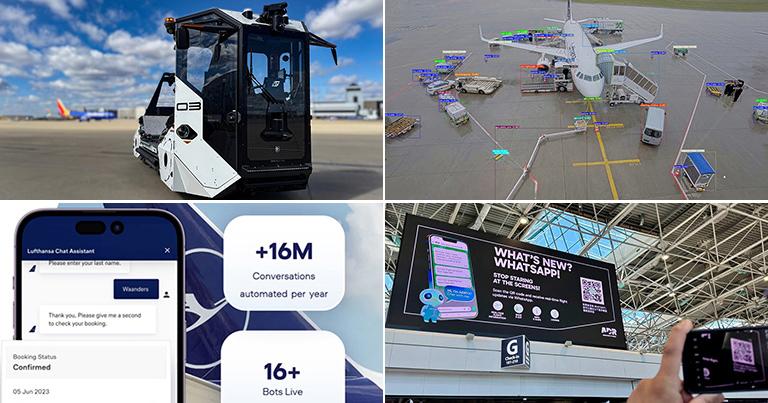AeroGenie — Seu Copiloto Inteligente.
Tendências
Categories
Experts Discuss the Impact of Advanced Autonomy and Progress Toward Artificial General Intelligence

Experts Discuss the Impact of Advanced Autonomy and Progress Toward Artificial General Intelligence
Agentic artificial intelligence (AI)—systems capable of autonomous decision-making and ownership of outcomes—is increasingly being adopted across various industries, with air transport emerging as a prominent testing ground. Unlike traditional AI, which primarily responds to inputs, agentic AI independently executes tasks, interacts with humans, and adapts to changing environments. This evolution is reshaping operational models and accelerating progress toward the development of Artificial General Intelligence (AGI).
Leading organizations such as Cincinnati/Northern Kentucky International Airport (CVG), Lufthansa Industry Solutions, Aeroporti di Roma, Fraport, and DataArt have been at the forefront of implementing agentic AI solutions. These industry leaders recently shared their insights on the practical applications and future potential of agentic AI ahead of the FTE Global event—often described as the “CES of Aviation”—scheduled for September 2025 in Long Beach, California.
Real-World Applications at CVG Airport
CVG Airport, a Corporate Partner of the FTE Digital, Innovation & Startup Hub, is actively deploying agentic AI technologies to improve operational efficiency, enhance customer experience, and optimize asset utilization. Brian Cobb, Chief Innovation Officer at CVG, identifies three primary benefits of these systems. First, dynamic routing of stands, gates, and vehicles powered by AI reduces delays and streamlines traffic flow. Second, autonomous queue management and wayfinding agents help minimize wait times and provide personalized services, thereby increasing passenger satisfaction and ancillary revenue. Third, energy-optimization agents automatically adjust HVAC and charging systems based on occupancy forecasts, leading to significant reductions in power consumption.
Cobb emphasizes that these “sense-decide-act” agents enable far more rapid decision-making than traditional dashboard analytics, marking a shift from passive monitoring to active, autonomous management. Among the notable pilot projects at CVG are CLEAR (Critical Limits Evaluation & Adaptive Routing), a co-developed system that integrates sensor data to manage ground vehicle traffic by prioritizing logistics and personal vehicles to prevent bottlenecks and ensure smooth cargo operations. Additionally, the Aurrigo Auto-DollyTug® employs onboard vision and scheduling agents to optimize baggage and cargo movement on the ramp, addressing labor shortages and allowing staff to focus on higher-value tasks. Within the terminal, Veovo’s Curb-to-Gate Flow Agents utilize predictive models to manage passenger flow, maximize queue efficiency, and support concession partners with timely sales opportunities.
Challenges and Industry Response
Despite the promising benefits of agentic AI, its widespread adoption faces several challenges. Regulatory frameworks, ethical considerations, and the need for significant investments in infrastructure and workforce development remain critical concerns. As AI systems gain greater autonomy, issues related to accountability, transparency, and safety are increasingly under scrutiny.
The market has responded with growing investor interest in companies pioneering AI and robotics innovation. Industry players are accelerating research and development efforts, forging strategic partnerships, and exploring ways to leverage advanced autonomy to maintain competitive advantage. Recent technological breakthroughs, including Japan’s record-setting internet speeds and advancements in humanoid robotics, highlight the rapid pace of innovation and the intensifying global race to shape the future of AI-driven industries.
As agentic AI continues to mature, its integration into complex environments such as airports offers a compelling preview of a future in which machines not only assist but actively manage and optimize critical operations, bringing the vision of Artificial General Intelligence closer to realization.

Emirates Unveils Cabin Design for New Boeing 777X

Eighteen Years On, the Airbus A380 Remains Central to a $34 Billion Airline

How a boom in luxury airline seats is slowing down jet deliveries

Navitaire Outage Attributed to Planned Maintenance

DigiYatra Debuts Outside Aviation at India AI Impact Summit

Vietnam Orders Strengthen Boeing’s Commercial Outlook

Airbus Signals Uncertainty Over Future A400M Orders

JobsOhio Awards $2 Million Grant to Hartzell Propeller for Innovation Center

Collins Aerospace Tests Sidekick Autonomy Software on YFQ-42A for U.S. Air Force CCA Program

How the Airbus A350-1000 Compares to the Boeing 777
